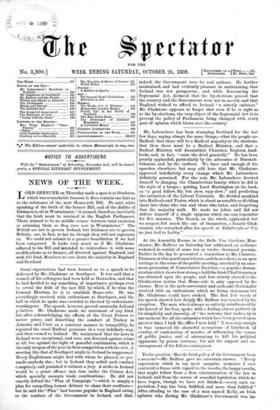Great expectations had been formed as to a speech to
be 'delivered by Mr. Gladstone at Southport. It was said that a council of his colleagues had been held at Hawarden, and that he had decided to say something of importance, perhaps even to reveal the drift of the new Bill by which, if he wins the General Election, he is to establish Home-role. He was accordingly received with enthusiasm at Southport, and the ball in which he spoke was crowded to the roof by enthusiastic worshippers. The speech, however, proved unusually dull and pointless. Mr. Gladstone made no statement of any kind, but after acknowledging the efforts of the Great Powers to secure peace, and describing the conduct of Turkey in .Armenia and Crete. as a constant menace to tranquillity, he repeated the usual Radical promises in a very indefinite way, and then turned to Ireland. He maintained that the laws in Ireland were exceptional, and were not directed against crime at all, but against the right of peaceful combination, which is the only weapon of the poor in their competition with the rich. A meeting like that of Southport might in Ireland be suppressed. Every Englishman might deal with whom he pleased, or per- suade anybody else ; but in Ireland they called such conduct conspiracy, and punished it without a jury. A strike in Ireland would be a penal offence (not true under the Crimes Act, which specially exempts trade combinations). He did not exactly defend the "Plan of Campaign "—which is simply a plan for compelling honest debtors to cheat their creditors— but he said the "Plan" had become popular in England owing to the conduct of the Government in Ireland, and that,
indeed, the Government were its real authors. He further maintained, and had evidently pleasure in maintaining, that Ireland was not prosperous ; and while denouncing the Septennial Act, declared that the by-elections proved that the country and the Government were not in accord, and that England wished to afford to Ireland " a sisterly embrace." Mr. Gladstone appears to forget that even if he is right as to the by-elections, the very object of the Septennial Act is to prevent the policy of Parliament being changed with every gust Of opinion which blows over the country.






































